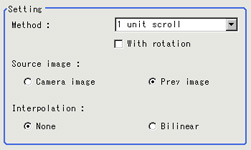Compensation Method (Position Compensation)
Set the compensation method for position compensation.
- In the "Item tab" area, tap [Scroll method].
- Set the parameters.

| Set value [Factory default] | |
|---|
| | This performs a position compensation by referring to the coordinates measured with the search processing unit or edge position processing unit [Note 1]immediately before the [Position Compensation] (automatic processing unit). This moves the image by the difference between the measured coordinates and the reference coordinates of the referring search processing unit or edge position processing unit. |
| This performs a position compensation by referring to the coordinates measured with the search processing unit or edge position processing unit [Note 1]immediately before or two units before the [Position Compensation] (automatic processing unit). |
| Set whichever position compensation you prefer.Set the reference coordinates and measurement coordinates. |
| The image for the immediately preceding image input (Camera image input/Camera switching) is displayed.When position compensation has been performed, the status returns to that from before position compensation. If Filtering or Color Gray Filter had been performed, the original image with Filtering or Color Gray Filter released is displayed. |
| | When "1 unit scroll" or "2 unit scroll" is selected as the setting method, place a check for executing position compensation in the rotation direction in addition to the XY directions. |
| | The camera input image that has not been subject to filtering is subject to compensation as is. |
| Images to which filtering and position compensation processing are applied in units even before the "Position Compensation" being set are the targets. |
| | Position compensation is performed in units of pixels. |
| This option joins more than one point with a line in order to find a desired approximate value.The image will become smoother. |
When you choose the "Expression" option
- Using expressions, specify the "Ref.Position" and "Position" which are used to determine the position compensation.
Differences between the respective values in the "Ref.Position" and "Position" areas give the amount of position compensation to be performed.